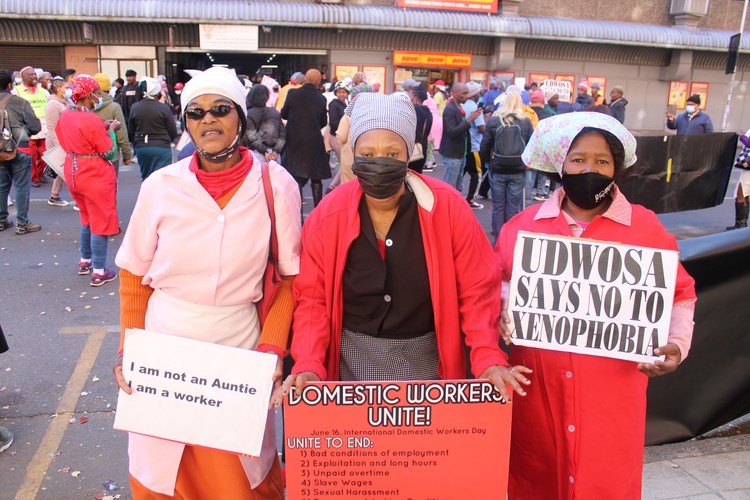Domestic workers march in Pretoria for decent pay and benefits
“There is a need for domestic workers to unite and fight for our rights” says worker
Phumzile Khumalo, Lettie Skhosana and Ella Skhosana are domestic workers in Pretoria suburbs. They joined a hundred other domestic workers who marched on Thursday to demand fair treatment and pay. Photo: Kimberly Mutandiro
Over a hundred domestic workers dressed in bright uniforms and carrying irons and mops marched through the streets of Pretoria on Thursday to mark International Domestic Workers Day.
The marches to the Department of Labour with a memorandum of demands, but no officials were there to receive the memo.
The protesters included local and migrant female domestic workers and some male gardeners who work in suburbs across Gauteng.
The march was supported by the United Domestic Workers of South Africa (UDWOSA), Zimbabwe Isolated Women of South Africa (ZIWISA) and Izwi Domestic Workers Alliance.
“Domestic workers played a major role in bringing freedom in South Africa. Amongst the women who marched on 9 August 1956 were domestic workers who brought their white employers’ children to the Union Buildings,” read their memo.
The workers want decent working and living conditions for those who live on their employer’s premises. The workers are also demanding to be registered for Unemployment Insurance Fund (UIF) and Compensation for Occupational Injuries (COIDA) and Diseases regardless of citizenship and other employment benefits.
Workers complained of being manhandled, mauled by employers’ dogs, racism, xenophobia and sexual harassment at work.
Pinky Mashiane, a domestic worker and founder of UDWOSA, said, “There is a need for domestic workers to unite and fight for our rights. For a long time we have been oppressed. Many of us are underpaid and face all forms of abuse. The work we do is very important but to date many of us are failing to receive incentives worthy of our job.”
Ethel Musonza, from ZIWISA, said some employers took advantage of people who are undocumented. “They deprive them of receiving benefits such as UIF and COIDA. Even in cases where they are documented they are still deprived. This must change.”
Musonza said the termination of the Zimbabwe Exemption Permit (ZEP) meant many domestic workers were facing an uncertain future. “The Department of Labour must intervene,” she said.
Support independent journalism
Donate using Payfast

Next: “Our children can’t play outside any more” say Hillview residents
Previous: High Court wrong about law on foetuses under 26 weeks, Concourt rules
© 2022 GroundUp. This article is licensed under a Creative Commons Attribution-NoDerivatives 4.0 International License.
You may republish this article, so long as you credit the authors and GroundUp, and do not change the text. Please include a link back to the original article.
We put an invisible pixel in the article so that we can count traffic to republishers. All analytics tools are solely on our servers. We do not give our logs to any third party. Logs are deleted after two weeks. We do not use any IP address identifying information except to count regional traffic. We are solely interested in counting hits, not tracking users. If you republish, please do not delete the invisible pixel.

